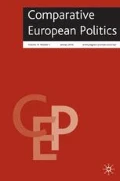Abstract
This article presents a typology of Muslim councils. The typology identifies two central ways in which these bodies vary: how they are formed (by the government or by the Muslim community) and who can be a member (universal or restricted by sect, ethnicity or national origin). The central claim in this article is that the nature of Muslim council present in a country is indicative of the extent to which Muslims will be incorporated into the policy-making process. Councils that condition representation on membership in a given sect or ethnic heritage are overall less likely to be incorporated in the policy-making process. Compared with those councils created by the Muslim community and elevated to official status, councils created by the state are also less likely to be a part of the policy-making process. In addition, when state-created councils are consulted, it is likely to be perfunctory rather than a meaningful discussion. In order to provide an empirical test to see what relationship, if any, exists between policy outcomes and the type of council in a given country, I look at the process of creating Muslim dress policy in Austria, France and the Netherlands.
Similar content being viewed by others
References
Allievi, S. (2003) Relations and negotiations: Issues and debates. In: B. Maréchal, S. Allievi, F. Dassetto and J. Nielsen (eds.) Muslims in the Enlarged Europe: Religion and Society. Leiden, The Netherlands: Brill.
Bowen, J. (2007) Why the French Don’t Like Headscarves: Islam, the State, and Public Space. Princeton, NJ: Princeton University Press.
Brewin, C. (1997) Society as a kind of community: Communitarian voting with equal rights for individuals in the European Union. In: T. Modood and P. Werbner (eds.) The Politics of Multiculturalism in the New Europe. London: Zed Books.
Ciciora, A. (2010) Integrating Ireland’s Muslims: Attitudes of Muslim and Irish elites towards value compatibility and the mainstreaming of Islam. Journal of Muslim Minority Affairs 30(2): 199–216.
Dolezal, M., Helbling, M. and Hutter, S. (2008) Conflicts over Islam in Austria, Germany, and Switzerland: Between Ethnic Citizenship, State-Church Relations and Right-Wing Populism. Die Verfassung Der Demokratien. Universität Osnabrück.
Fetzer, J.S. and Soper, J.C. (2005) Muslims and the State in Britain, France, and Germany. Cambridge, UK: Cambridge University Press.
Gould, A.C. (2009) Muslim elites and ideologies in Portugal and Spain. West European Politics 32(1): 55–76.
Hussain, D. (2014) The UK. In: J.S. Nielsen, S. Akgonul, A. Alibasic, B. Marechal and C. Moe (eds.) Yearbook of Muslims in Europe Volume 6. Leiden, The Netherlands: Brill.
Kaya, A. (2009) Islam, Migration, and Integration. London, UK: Palgrave Macmillan.
Klausen, J. (2005) The Islamic Challenge: Politics and Religion in Western Europe. Oxford: Oxford University Press.
Koning, M.D. (2009) The Netherlands. In: J.S. Nielsen, S. Akgonul, A. Alibasic, B. Marechal and C. Moe (eds.) Yearbook of Muslims in Europe. Leiden, The Netherlands: Brill.
Laurence, J. (2005) From the Elysee salon to the table of the republic: State-Islam relations and the integration of Muslims in France. French Politics, Culture & Society 23(1): 37–64.
Laurence, J. (2009) The corporatist antecedent of contemporary State-Islam relations. European Political Science 8(3): 301–315.
Laurence, J. (2012) The Emancipation of Europe’s Muslims: The State’s Role in Minority Integration. Princeton, NJ: Princeton University Press.
Melotti, U. (1997) International migration in Europe: Social projects and political cultures. In: T. Modood and P. Werbner (eds.) The Politics of Multiculturalism in the New Europe. London: Zed Books.
Nielsen, J. (2004) Muslims in Western Europe, 3rd edn. Edinburgh, UK: Edinburgh University Press.
Panitch, L. (1980) Recent theorizations of corporatism: Reflections on a growth industry. The British Journal of Sociology 31(2): 159–187.
Permoser, J.M. and Rosenberger, S. (2009) Religious Citizenship Versus Policies of Immigrant Integration: The Case of Austria. In: P. Bramadat and M. Koenig (eds.) International Migration and the Governance of Religious Diversity. Montreal & Kingston: McGill-Queen's University Press.
Permoser, J.M., Rosenberger, S. and Stoeckl, K. (2010) Religious organizations as political actors in the context of migration: Islam and Orthodoxy in Austria. Journal of Ethnic and Migration Studies.
Pfaff, S. and Gill, A. (2006) Will a million Muslims march? Muslim interest organizations and political integration in Europe. Comparative Political Studies 39(7): 803–828.
Schmitter, P.C. (1974) Still the century of corporatism. The Review of Politics 36(1): 85–131.
Sunier, T. (2005) Interests, identities, and the public sphere: Representing Islam in the Netherlands since the 1980s. In: J. Cesari and S. McLoughlin (eds.) European Muslims and the Secular State. Burlington, VT: Ashgate.
Wihtol de Wenden, C. (1996) Muslims in France. In: W.A.R. Shadid and P.S. Van Koningsveld (eds.) Muslims in the Margin: Political Responses to the Presence of Islam in Western Europe. Kampen, The Netherlands: Pharos.
Acknowledgements
The author would like to thank Ron Hassner, Jonah Levy, Steve Vogel, Nick Ziegler, and three anonymous reviewers for their feedback, comments and advice.




